
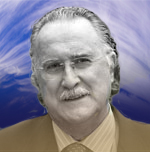 Iñaki Azkuna, Mayor of Bilbao (Spain) has been awarded the 2012 World Mayor Prize  FRONT PAGE About World Mayor    • THE 2014 WINNERS • THE 2014 PROJECT • WM HISTORY • The 2014 shortlist • The 2014 longlist • Code of Ethics • The World Mayor Prize  The 2012 results The 2012 project The 2012 shortlist The 2012 long-list Code of Ethics | Código de Ética | The World Mayor Prize World Mayor Prize winners exchange letters  Mayor of Bilbao debates Mayor of Perth debates Mayor of Bilbao interview Mayor of Perth profile  For Mayor of Amuwo Odofin For Mayor of Angeles City For Mayor of Ankara For Mayor of Auckland For Mayor of Bilbao For Mayor of Changwon City For Mayor of El Paso For Mayor of Ljubljana For Mayor of Matamoros For Mayor of Minneapolis For Mayor of Newark For Mayor of Perth For Mayor of Puerto Montt For Mayor of Quebec City For Mayor of Surakarta For Mayor of Tel Aviv For Mayor of Zeralda  The 2010 results The 2010 project The 2010 finalists Marcelo Ebrard says thank you Mick Cornett says thank you Helen Zille and Marcelo Ebrard exchange letters  The 2008 results The 2008 project The 2008 finalists The World Mayor Award Helen Zille thanks supporters Mayors of Melbourne and Cape Town exchange letters  The 2006 results Methodology The 2006 finalists The World Mayor Award Dora Bakoyannis congratulates John So  The 2005 results Contest methodology List of finalists Winning mayors write Mayor Rama writes - Mayor Bakoyannis replies  The 2004 contest List of all 2004 finalists Edi Rama wins 2004 award People ask - Edi Rama replies  Front Page Site Search About City Mayors |
Iñaki Azkuna, Mayor of Bilbao, Spain
8 January 2013: Iñaki Azkuna, Mayor of Bilbao, Spain, has been awarded the 2012 World Mayor Prize. It has been said that Bilbao’s transformation from a declining industrial city in Spain’s northern Basque Province to an international centre for tourism and the arts has been sparked by two events: the opening of the Guggenheim Museum in 1997 and the election of Iñaki Azkuna as mayor two years later. |
|
Rank
|
Mayor
|
City
|
Country
|
|
1
|
Iñaki Azkuna | Bilbao | Spain |
|
2
|
Lisa Scaffidi | Perth | Australia |
|
3
|
Joko Widodo | Surakarta | Indonesia |
|
4
|
Régis Labeaume | Québec City | Canada |
|
5
|
John F Cook | El Paso | USA |
|
6
|
Park Wan-su | Changwon City | South Korea |
|
7
|
Len Brown | Auckland | New Zealand |
|
8
|
Edgardo Pamintuan | Angeles City | Philippines |
|
9
|
Mouhib Khatir | Zeralda | Algeria |
|
10
|
Alfonso Sánchez Garza | Matamoros | Mexico |
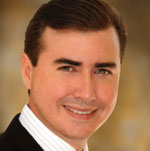 In 10th place
In 10th placeAlfonso Sánchez Garza, Mayor of Matamoros, Mexico
When elected Mayor of Matamoros in July 2010, Alfonso Sánchez Garza was described as one of Mexico’s political rising stars. The city is situated on the Rio Bravo across the border from Brownsville, Texas.
Alfonso Sánchez founded the Ophthalmologic Institute of Matamoros, which runs important programmes such as bringing in ‘brigades’ of doctors from the US to conduct eye tests, and in certain cases eye surgery, for the elderly. The programme involves the free distribution 800 pairs of spectacles a month to the poor. Alfonso Sánchez, who has also been deputy for Matamoros, won the mayoral elections with 64 per cent of the vote as a direct result of his dedication and intense activities in helping the needy.
In a country that includes five of the ten most murder-ridden cities in the world, it takes a courageous man to stand for mayor. Since the beginning of 2005 more than 60 mayors and former mayors were murdered. In 2012 alone, 19 mayors and mayoral candidates were killed by members of drug cartels. The cartels seek to win influence in local government to control the appointments of police chiefs and gain public contracts.
While the mayor is a member of Mexico’s governing Institutional Revolutionary Party (IRP), he runs his office in a non-partisan manner.
Mayor Sánchez signed up to the City Mayors Foundation Code of Ethics.
Typical testimonal:
Alfonso Sánchez has done an outstanding job for Matamoros. Considering the appalling record of previous mayors, it is really impressive how much good work he has done. Previous mayors limited themselves to paving some streets, whereas this man allocated resources to restore parks, improve the city traffic by remodeling the main street of the city, implemented free wireless internet in some of the most visited places, rebuilt the local police force, created job opportunities for the people and even reduced the violence in the city compared with previous administrations.
TESTIMONIAL
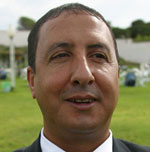 In 9th place
In 9th placeMouhib Khatir, Mayor of Zeralda, Algeria
During his time in office, Mouhib Khatir has become an outspoken critic against corruption. In 2011 the Algerian authorities arrested and imprisoned him for seven months. He was later released without charge after the intervention of Transparency International. Most testimonials mention the mayor’s courage in a less-than-democratic country and one with a recent history of extreme violence, with some commentators hoping that the mayor’s short-listing for the World Mayor Prize should encourage other mayors to follow his example. One citizen said the mayor always defended his city against the development mafia.
Following Algeria’s local elections in December 2012, Mouhib Khatir wrote to the City Mayors Foundation explaining why he did not run again:
“I did not run again for the position of Mayor which is now only ceremonial with no powers whatsoever. This is due to the introduction in September 2011 of the "nouveau code communal" (new municipal code) which stripped the position of mayor of all its powers (the State now manages local authorities). To my great regret the position of Mayor now is the equivalent of a forest ranger (Garde Champêtre). When in 2009, I and fellow mayors created the Mayors' Forum my first aim was to question and to amend the Municipal Code with the support of other mayors best placed to manage at a local level. Sadly, the Government decided to do without our help.
I have to point out that during the last five years (2007 to 2012) I have, together with my colleagues, been subjected to threats, harassment and blackmail by the same people who kidnapped me and sent me to jail for seven months under false accusations. All this had the sole aim to silence me. With the latest developments, corruption is not going to go away in our cities. I will continue to work and fight all types of corruption and misuse of authority.”
Typical testimonial
Mouhib Khatir was jailed because he was fighting against corruption and for the rights of his fellow citizens.
TESTIMONIAL
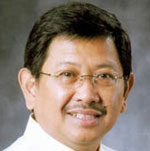 In 8th place
In 8th placeEdgardo D Pamintuan, Mayor of Angeles City, Philippines
Since becoming Mayor of Angeles City in July 2010, Edgardo Pamintuan concentrated on improving the city’s health system, providing better education for all and investing in infrastructure. He has remained popular with residents who welcome improvements in drainage and environmental infrastructure, as well as work on healthcare and welfare, including education. Testimonials praise the mayor for specific achievements, including: being the first mayor to build a city college providing low-cost education; the planting of 200,000 trees with help from volunteers, which apparently will help avoid flooding; the cleaning of major drainages and for modernizing the city hospital, including installing dialysis facilities.
Edgardo Pamintuan has also maintained the confidence of business leaders, who believe that the mayor’s efforts in curbing graft and corruption are succeeding. The administration of Mayor Pamintuan has also been awarded the Seal of Good Housekeeping by the country’s Ministry of Local Government.
Mayor Pamintuan signed up to the City Mayors Foundation Code of Ethics.
Typical testimonial:
I am Gerald, a 17-year-old college student from Angeles City, Philippines. Edgardo Pamintuan, our city mayor, deserves the World Mayor Prize. I have witnessed his hard work and dedication to serve his fellow men. His passion to public service has contributed to the betterment of our city. He knows the needs of his fellow men and he has never failed to provide for all these needs.
TESTIMONIALS
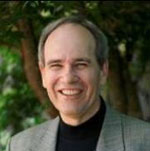 In 7th place
In 7th placeLen Brown, Mayor of Auckland, New Zealand
Len Brown, elected in October 2010, is the first mayor of the so-called super city of Auckland, which was formed in 2010 by the amalgamation of seven local councils and one regional council. He began his political career in 1992 as Manukau City councillor and was elected Mayor of Manukau City in 2007.
Residents praise Mayor Brown for his bold and exciting vision. While Auckland is already being named by Mercer Consulting as the third most liveable city in the world, Mayor Brown aims for Auckland to replace Vienna at the top of the table. He believes this can be achieved by creating a world-class transport system, attracting high-value companies and skilled workers, protecting the city’s and region’s natural resources and, above all, making Auckland a city where every citizen feels at home.
Mayor Brown signed up to the City Mayors Foundation Code of Ethics.
Typical testimonial:
Mayor Len Brown has been a fantastic leader for Auckland since the amalgamation of eight councils into one super city council. He has the ability to pull people round the table and reach a happy compromise. He can relate to all levels and groups of society and has a regular presence in many communities across our city. He is approachable, relatable, visionary, collaborative, consultative, and has a great singing voice! He is a man of the people, and is particularly good at protecting the rights of the most vulnerable across our city. He has been a great mayor and I hope he wins the next elections.
TESTIMONIALS
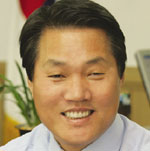 In 6th place
In 6th placePark Wan-su, Mayor of Changwon City, South Korea
Park Wan-su became Mayor of Changwon City in a by-election in 2004 and won his first full term in 2006. In 2010 he became the first mayor of the super city of Changwon after the amalgamation of Changwon, Masan and Jinhae. Changwon City now has a population of some 1.1 million people.
Park Wan-su received a PhD in public administration from Kyungnam University and has published several books including Society with Principle and Society With Hope. Besides his civil service career, he was a professor and dean of government school, Kaya University.
The mayor’s environmental initiatives have won attention outside the country and seemingly gone beyond concrete measures towards changing people's perceptions in this area. The city has been described as the environmental capital of South Korea. Recently Mayor Park Wan-su cooperated with the German city of Freiburg and Curitiba, Brazil, on environmental issues.
Mayor Park Wan-su signed up to the City Mayors Foundation Code of Ethics.
Typical testimonial:
I am living in Changwon and I appreciate this opportunity to recommend Mayor Park of Changwon City to you. I lived on the outskirts of Changwon before I moved into the city. When I first moved here, I had a difficult time getting accustomed to my life in this city as the environment wasn't as good as it is now. The air pollution was severe and streams were so polluted that I couldn't spend time with my kids here like I could in other areas. But Changwon has been greatly changed in relation to the environment since Mayor Park took office. He announced that he would restore polluted streams and recreational areas to an ecologically healthy state and he made good on this promise.
TESTIMONIALS
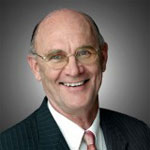 In 5th place
In 5th placeJohn F Cook, Mayor of El Paso, USA
John F Cook took office in 2005 after defeating the incumbent mayor. He won re-election in 2009 but, due to term limits, is prevented from standing for a third term in 2013. Under the mayor’s leadership, El Paso has been repeatedly named as one of the safest cities in the US despite its close proximity to Juarez (Mexico), the world’s second most murder-afflicted city.
In 2011 Mayor Cook came to national and international prominence when he and two city councillors voted to restore health benefits to gay and unmarried partners of city employees. The benefits were withdrawn after a public ballot sponsored by religious conservative groups succeeded in November 2010. Following the mayor’s vote a ‘family values’ group mounted an unsuccessful attempt to recall him from office.
For Mayor Cook the fight, which began in 2009 when the city council approved health benefits for both and gay and straight domestic couples, has been against intolerance and bigotry. He said government had no business enforcing an Old Testament moral code on its citizens.
The majority of testimonials praise Mayor Cook for his refusal to give in to social and religious conservatives who seem to form a sizeable part of the local community and his determination to maintain a liberal and inclusive environment in the city and administration. There are some comments which criticise the mayor for ‘overriding a public vote’.
Mayor Cook signed up to the City Mayors Foundation Code of Ethics.
Typical testimonial
It's always tough to stand up and say no to bigotry, especially when it’s masquerading as Divine law being preached by religious leaders. I've known John Cook for more than thirteen years and have seen him more than once defend what was right, even when it wasn't convenient to do so.
El Paso has always been a tolerant community but not by chance. Every fifty to sixty years, the faces of bigotry and hate raise their ugly heads, starting with the Ku Klux Klan attempting to take over the city in the 1920s to the fight for equality during the early 1960s.
But, fortunately, we've always seen a small group of leaders willing to fight back against the forces of evil, starting with Mayor R. M. Dudley in 1923 as he won election against a KKK candidate, taking a strong stand against the hate group and then Mayor Bert Williams who persuaded the City Council to approve the first anti-discrimination ordinance of its kind in Texas, and possibly in the nation, in 1962.
And now, fifty years later, we have Mayor John Cook, who together with a courageous group of city council members has taken a strong stand against the faces of evil. Thank you Mayor Cook for continuing to show the world that El Paso will only close its doors to those that profess and teach hate and bigotry!
TESTIMONIALS
 In 4th place
In 4th placeRégis Labeaume, Mayor of Québec City, Canada
Régis Labeaume was elected mayor in December 2007 following the death of the then mayor Andrée Boucher. He was re-elected in November 2009 with almost 80 per cent of the vote.
Positive testimonials highlight his hard work, a rough-and-ready manner or even confrontational style, which people seem to like and his ability to direct state moneys towards the city, and his honesty. There are repeated comments on residents' pride in their city. Others comment on the number of international events or concerts the mayor has brought to Québec.
Mayor Labeaume insists there is no corruption and none will be tolerated in the Québec City government.
Mayor Labeaume signed up to the City Mayors Foundation Code of Ethics.
Typical testimonial
Since Régis Labeaume’s arrival as a mayor, Quebec City has been waking up. The Mayor decided to invest in many projects to create dynamism in cultural and business activities and to decrease administration expenses. Before him, Québec was a city without pride. Now, citizens of other cities in the French province (Quebec) dream of having mayor like him. Congratulations Mr Labeaume, you're simply the best.
TESTIMONIALS
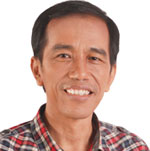 In 3rd place
In 3rd placeJoko Widodo (Jokowi), Mayor of Surakarta, Indonesia
In July 2005 he became the first directly-elected mayor of his city and in September 2012 was elected Governor of Jakarta. While Mayor of Surakarta - also known as Solo - Joko Widodo turned a crime-ridden city into a regional centre for arts and culture, which has started to attract international tourism. His campaign against corruption earned him a reputation for being the most honest politician in Indonesia. Joko Widodo also declined to take a salary while mayor of Surakarta.
There is here a long list of positive testimonials and genuine and very enthusiastic praise for the mayor, most particularly for his honesty and refusal to be corrupted - apparently an exception in Indonesia.
He is seen as a public servant sensu stricto. His personal qualities, apparent humility, hands-on and people-oriented approach are appreciated. One testimonial states: He spends or spent when mayor of Solo just one hour in the office and the rest of the day going around the city. He recently won elections to become the governor of Jakarta by a clear margin, which is like several million positive testimonials, and likely a massive vote against corruption.
While under the World Mayor rules, a mayor must be in office on the closing date of the popular vote to be included in the top ten. An exception was made for Joko Widodo because of the exceptional high number of votes he received during the first and second round of the contest.
Mayor Widodo signed up to the City Mayors Foundation Code of Ethics.
Typical testimonial
It is rare to find a mayor who is not corrupt in Indonesia. In Joko Widodo we have one. He uses public money for the right purposes. He is a simple and humble guy who pays lots of attention to less fortunate people.
MORE TESTIMONIALS | PROFILE
 In 2nd place
In 2nd placeLisa Scaffidi, Mayor of Perth, Australia
Lisa Scaffidi was first elected Lord Mayor of Perth, Western Australia, in October 2007. She defeated the outgoing Deputy Lord Mayor by winning 56 per cent of the vote. She stood for re-election to a second four-year term in October 2011 and won with a margin of 25 per cent over her principal challenger. Mayor Scaffidi was the Chief Executive Officer within Western Australia for the business-led Committee for Economic Development of Australia for 11 years until becoming mayor.
During Lisa Scaffidi’s first term the city council produced its 2009 four-year plan and the mayor will now oversee its 2013 successor. She is strongly promoting sustainable growth and both the city strategy and its organisational structure reflect that. In 2008-9 the city hired legendary urban designers Gehl Architects to produce a Public Spaces Public Life plan, which was incorporated in all the current strategies.
Lisa Scaffidi says: “I am very pro smarter and more sustainable use of our land. I do not believe that it comes with loss of conservation but that it enables and actually promotes more conservation through smarter and more focused land use and planning.”
In testimonials the mayor is praised for her efforts to make Perth more attractive, cosmopolitan and livable. Residents praise her management of the city's growth on the back of increased mining-based prosperity. Lisa Scaffidi is depicted as putting Perth on the business, investment and travel map.
The mayor’s personal and professional qualities are praised: she is described as being open to ideas and cultures, a "connector of people [who facilitates] positive outcomes" and a "catalyser" of "city-making projects." She is also described as working well with state authorities to improve infrastructures - for example, on the City Link rail project.
The mayor is credited for her efforts to make Perth a world-class centre of scientific research, not just a service centre for the mining industry.
Residents also confirm that she has helped transform Perth from a "dull hick town" or "boring city”, while others commend her for not getting involved with politics but "with the job she was voted to do in the first place." While the mayor’s numerous foreign trips were criticised by her political opponents, most Perth residents believe Mayor Scaffidi has been a good international ambassador for Perth.
There is some criticism of the mayor’s vision of Perth's development, with some environmentalists complaining that too much open space was sacrificed to new developments.
Mayor Scaffidi signed up to the City Mayors Foundation Code of Ethics.
Typical testimonial:
Perth is undergoing rapid change at an important time in our relatively short history. Lisa Scaffidi has the vision and the drive to make sure we not only make the most of our current opportunities but become a thriving city people love and are proud of on the world stage. For a long time it's been a case of status quo and resistance to any new and bold ideas. I see Perth evolving under Lisa's stewardship to a dynamic city, which is long overdue. I commend her strong character and leadership to make decisions with long-term foresight as opposed to short term populism. Behind the scenes she's actively engaged with the cities around the world exploring ways that ensure a sustainable future. This can only be achieved by working together and learning from each other. I'm excited about Perth's future!
MORE TESTIMONIALS | IN DEBATE | PROFILE
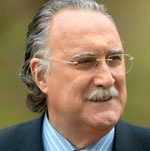 In 1st place
In 1st placeIñaki Azkuna, Mayor of Bilbao, Spain
Since his election in 1999, Iñaki Azkuna has overseen Bilbao’s transformation from a declining industrial town into an international centre for tourism and the arts. It has been said that Bilbao’s total renovation has been sparked by two events: the opening of Guggenheim Museum in 1997 and the election of Iñaki Azkuna as mayor two years later. Since being first elected, Mayor Iñaki Azkuna has used the high profile of the Guggenheim Museum, designed by architect Frank Gehry, to rebuild the city. The Bilbao Guggenheim has become the European iconic equivalent of the Sydney Opera House.
When in the early 1990s Bilbao decided to spend almost US$230m of public money on a museum of modern, many doubters accused the city of squandering precious resources. But developments since then have silenced the critics. Annual visitor numbers to the city increased from 100,000 before the museum’s opening to more than 700,000 in 2011. The Guggenheim is estimated to have contributed some €2.4 billion (US$3.1bn) to the Basque Province’s GDP since October 1997.
In a recent interview with City Mayors, Mayor Azkuna stressed that Bilbao did not construct the Museum just to have an iconic building. It was part of a wider development plan involving a new subway line, the redevelopment of the river frontage and a new airport. The Guggenheim was the icing on the cake.
Unlike most cities in Spain and Europe, Bilbao is virtually debt-free. During the years of prosperity in the early part of this century the city under the administration of Iñaki Azkuna steadily reduced its debt until it was paid off in 2011. The city will now only incur new debt for projects that will strengthen the future of Bilbao.
The mayor’s open and transparent administration even enjoys the support of those who do not generally vote for his Basque Nationalist Party. One resident wrote in his testimonial that the mayor’s vote seemed to be going up with every election.
Mayor Azkuna signed up to the City Mayors Foundation Code of Ethics.
Mayor Azkuna died on 20 March 2014, aged 71.
Typical testimonial
My vote is for Iñaki Azkuna. He has done an awesome job for Bilbao. Bilbao was a few years ago an industrial city, with pollution and without any kind of welfare. When all the industry disappeared, Bilbao suffered a terrible time. Additionally, the 1983 floods almost destroyed the old part of our city, with the economic crisis at the time preventing any recovery. That was the situation Iñaki Azkuna faced when first elected mayor in 1999. Since then Bilbao has become one of the showcase cities of Europe. He has won many prizes for that. He is also honest, confident and a fantastic person. And he is always smiling! We all congratulate Mr. Azkuna for all his work.
MORE TESTIMONIALS | IN DEBATE | PROFILE
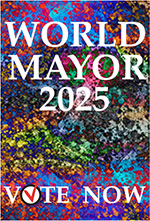
Introducing
World Mayor
The City Mayors Foundation, the international think tank for local government, organises the World Mayor Project and awards the World Mayor Prize. The Prize, which has been given since 2004, honours mayors with the vision, passion and skills to make their cities incredible places to live in, work in and visit. The World Mayor Project aims to show what outstanding mayors can achieve and raise their profiles nationally and internationally.
The organisers of the World Mayor Project are looking for city leaders who excel in qualities like: honesty, leadership and vision, management abilities and integrity, social and economic awareness, ability to provide security and to protect the environment as well as the will and ability to foster good relations between communities from different cultural, racial and social backgrounds. The winner receives the artistically acclaimed World Mayor trophy, while the two runner-ups are given the World Mayor Commendation.
Mayors wishing to be considered for the World Mayor Prize will be asked to sign up to the City Mayors' Code of Ethics
Timetable
Nominations were accepted until the 17 May 2012. A shortlist of 25 nominees was published on 18 June. Voting took place until 20 October . The winner of the 2012 World Mayor Prize and other results of the World Mayor Project were announced on 8 January 2013.
Winners and runners-up
2004 to 2012
In 2004: Winner: Edi Rama (Tirana, Albania); Runner-up: Andrés Manuel López Obrador (Mexico City, Mexico); In third place: Walter Veltroni (Rome, Italy)
In 2005: Winner: Dora Bakoyannis (Athens, Greece); Runner-up: Hazel McCallion (Mississauga, Canada); In third place: Alvaro Arzú (Guatemala City, Guatemala)
In 2006: Winner: John So (Melbourne, Australia); Runner up: Job Cohen (Amsterdam, Netherland); In third place: Stephen Reed (Harrisburg, USA)
In 2008: Winner: Helen Zille (Cape Town, South Africa); Runner up: Elmar Ledergerber (Zurich, Switzerland); In third place: Leopoldo López (Chacao, Venezuela)
In 2010: Winner: Marcelo Ebrard (Mexico City, Mexico); Runner-up: Mick Cornett (Oklahoma City, USA); In third place: Domenico Lucano (Riace, Italy)
In 2012: Winner: Iñaki Azkuna (Bilbao, Spain); Runner-up: Lisa Scaffidi (Perth, Australia); In third place: Joko Widodo (Surakarta, Indonesia)